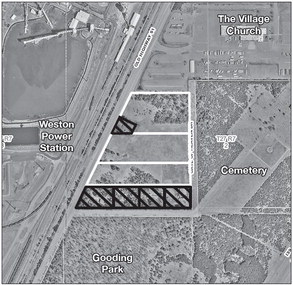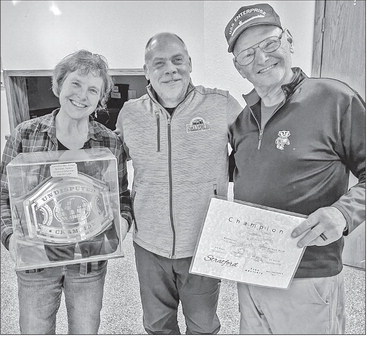Wind company sues two towns


By Kevin O’Brien
A renewable energy company looking to build a wind power operation in western Marathon County has followed through on its threat to sue a pair of townships over their wind licensing ordinances.
EDP Renewables, doing business as Marathon Wind Farm, filed a civil complaint against the towns of Brighton and Eau Pleine on June 20 in Marathon County Circuit Court, claiming that the towns’ regulations unlawfully prevent the construction of wind turbines. The towns have 20 days to respond to the complaint, or a judge could issue a summary judgment in EDP’s favor.
According to the lawsuit, Marathon Wind Farm has leased “approximately 12,000 acres of real estate” from 65 landowners in the towns of Brighton and Eau Pleine as part of its plan to develop a 99-megawatt wind energy facility. The company’s attorneys say EDP has been working on the proposed project since 2017 and has spent an more than $5 million on studies and other preparatory work.
EDP is asking the court to declare the ordinances “null and void” and issue an injunction preventing the towns from enforcing their regulations. As justification, the complaint cites Wis. Stat 66.0401(1m), which prohibits local municipalities from placing “any restriction, either directly or in effect, on the installation or use of a wind energy system that is more restrictive than the rules” set by the Public Service Commission (PSC).
The complaint points out all the ways in which the towns’ ordinances are more restrictive or demanding than what the PSC requires. For instance, the ordinances establish a 24-hour noise limit of 35 decibels, while the PSC allows noise levels to reach 50 decibels during the day and 45 at night.
Also, the ordinances include a minimum setback of either one mile or 10 times the turbine height, whichever is greater, from any property line. The PSC, on the other hand, allows turbines to be the lesser of 1,250 feet or 3.1 times the maximum blade tip height from “any occupied community buildings or non-
See LAWSUIT/ page 2 Lawsuit
Continued from page 1
participating residences,” or 1.1 times the maximum blade time from nonparticipating property lines, public rights-of-way, and overhead utility lines.
The ordinances also require permit applicants to guarantee that no property owners within two miles of a wind energy operation will see their property values decline as the result of the turbines. By contrast, the PSC mandates an annual payment of $1,000 (plus inflation) to any landowner within a halfmile of a property that has three or more turbines as compensation.
Several other provisions in the ordinances are alleged to be too restrictive, including requirements for an Environmental Impact Study, a prohibition on signage, reimbursement for damage to town and state roads, and establishment of an escrow account to pay for “post-construction environmental studies.”
Taken as a whole, the town ordinances represent a “one-size-fits-all” approach that “violates the Wisconsin statewide legislative policy that localities must evaluate each wind system on its own merits,” the complaint alleges.
The ordinances make it “effectively impossible for any applicant to receive a license for a wind energy system” in the towns of Eau Pleine and Brighton, according to the complaint, depriving residents of access to wind-generated energy and the potential employment of 100 workers.
Since Brighton and Eau Pleine enacted their ordinances in the spring of 2023, EDP has “all but halted” any work on developing the Marathon Wind Farm project, the complaint says. The company’s attorneys says EDP will “continue to be irreparably harmed” unless the towns’ ordinances are repealed.
The background
Brighton and Eau Pleine are just two of about a dozen rural townships in Marathon and Clark counties who adopted nearly identical ordinances in 2023, setting strict restrictions on industrial wind farm operations in response to a public backlash against EDP and other renewable energy companies signing leases with landowners.
The lawsuit filed on June 20 sheds light on EDP’s efforts, going back to 2017, to establish a wind power operation in Marathon County. Eau Pleine and Brighton were selected as a potential site for turbines due to “the available wind resource, proximity to transmission lines, and the supportive community,” the complaint states.
“Marathon Wind Farm, LLC” was created in 2018 as a subsidiary of EDP to “bring renewable, low-cost energy to residents of Wisconsin,” the lawsuit says, and in that same year, the company started signing leases with landowners for future turbine sites. The company began communicating with officials in Brighton and Eau Pleine the following year, 2019.
“Upon information and belief, all 65 landowners desire that their leased land be used to support Marathon Wind’s energy system(s),” the complaint states.
At the same time it was dealing with local residents and town officials, EDP says it was also working with Midcontinent Independent System Operator (MISO), an organization authorized by the federal government to review and approve large-scale energy projects seeking to connect with a regional transmission system.
As a requirement of MISO’s multi-year review process, EDP had to pay for several different studies, which may have to be re-done if the project is delayed, according to the lawsuit.
“These studies include, but are not limited to, a meteorological campaign, cultural resource studies, endangered wildlife, bird and bat studies, wetland and waterway delineations, environmental site assessments, and interconnection provider studies,” the complaint states.
In March, a spokesperson for EDP said the company’s goal was to work with the towns to find a solution and avoid legal action.
Locals respond
Mark Landwehr, Eau Pleine’s town chairman, said an attorney working for the town’s insurance company is handling the lawsuit, but local citizens have already made their views clear.
“A majority of our residents don’t want to look at these wind turbines,” he said. “That’s why we’re holding strong.”
Mark Krause, Brighton’s town chairman, did not respond to a request for comments.
In April, Brighton’s town board repealed and replaced its wind siting ordinance with one that includes looser setbacks and fewer requirements for wind operations.
The new ordinance more closely adheres to the regulations established by the PSC, which under state law has sole authority to regulate large-scale wind energy operations. So far, Brighton is the only township to repeal its more restrictive rules.
Farmland First, a group of rural landowners who oppose industrial wind and solar operations, was instrumental in getting Brighton, Eau Pleine and other townships to pass Wind Energy Facility (WEF) licensing ordinances, drafted by attorney Adam Jarchow of Clear Lake.
Earlier this year, after EDP filed notices of claim threatening to file a lawsuit, Farmland First members pledged a minimum of $30,000 to help Eau Pleine and Brighton cover their legal costs and offered to intervene in the case with its own legal team.
Farmland First argues that state statute 66.0401(1m)(a) allows local units of government to pass their own wind ordinances “to preserve or protect the public health and safety,” even if the regulations are more stringent than those established by the PSC. The ordinances adopted by the townships say state regulations are “inadequate to reasonably protect public health and safety.”
The state constitution “legally obligates government officials to protect the health, safety and well-being of their residents,” the ordinance says, going on to list a wide range of concerns about industrial wind operations, from the “disruption of views and skylines” to environmental impacts, damage to town roads, and the effects of noise and vibrations on wildlife and residents. It also points to “serious legal and economic downsides for landowners entering into complicated and one-sided lease/easement agreements.”
The ordinance also points out that the state’s Wind Siting Council, which is supposed to meet every five years to update regulations, did not do so in 2019, leaving the existing state regulations outdated. (See related story on the council’s latest report).
Trine Spindler, president of Farmland First’s Marathon County Chapter, said the group remains committed to fighting efforts to establish a wind operation in the area.
“If Marathon Wind prevails in Brighton and Eau Pleine, other developers are likely to push forward with similar projects in neighboring townships,” Spindler wrote in a statement. “Farmland First is committed to supporting Brighton and Eau Pleine with financial and legal assistance. We are actively raising more funds to strengthen our defense.”
Spindler said a total of 17 townships in Clark and Marathon counties have now adopted the Health and Safety Wind Ordinance promoted by Farmland First, “recognizing the dangers posed by industrial wind installations.”
Hoping to change state policy on industrial wind and solar operations, Farmland First has also endorsed Spindler in the race for the 86th Assembly District and Lori Voss in the 69th.
“We urge residents to show a united front and actively protect our neighborhoods,” Spindler said. “Every contribution will count in this crucial fight.”
Trine Spindler



